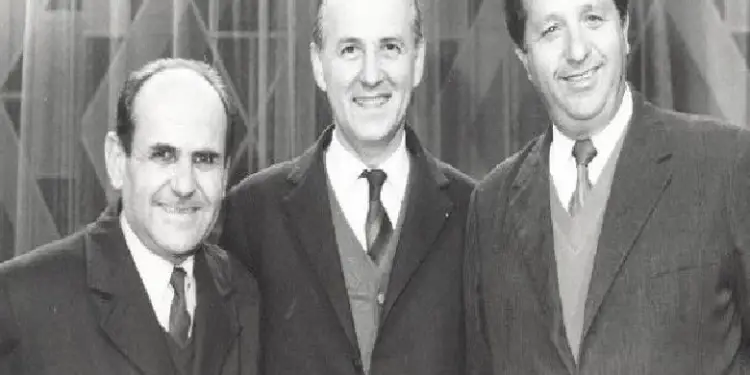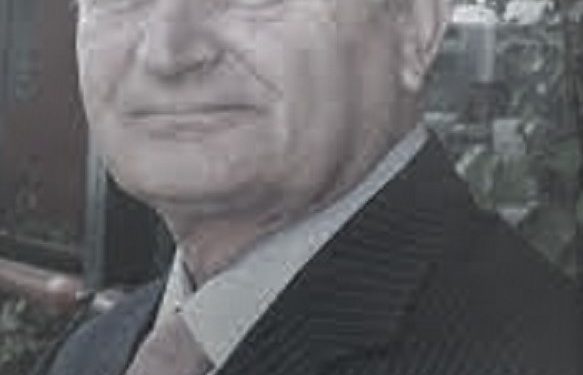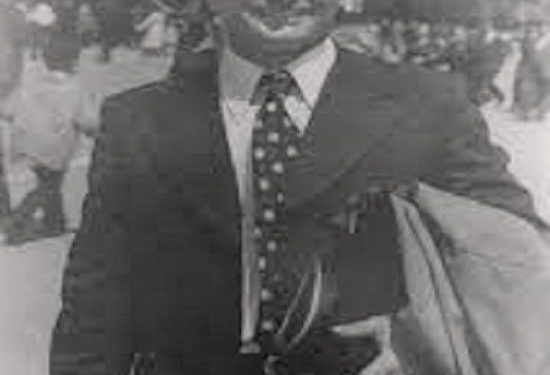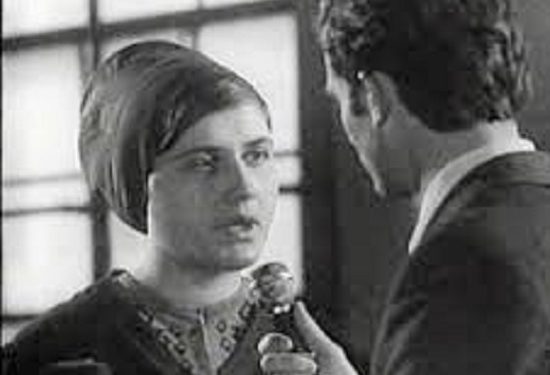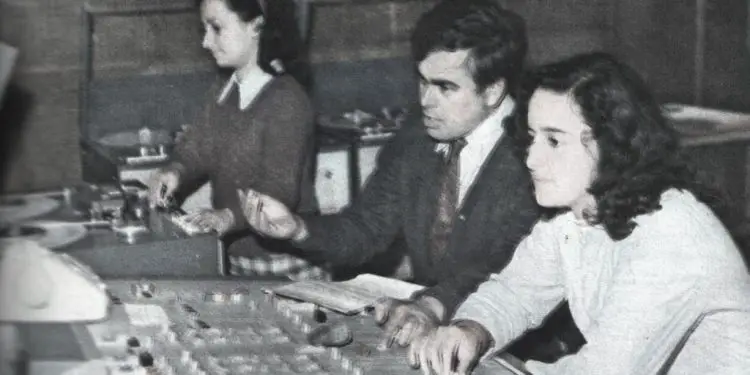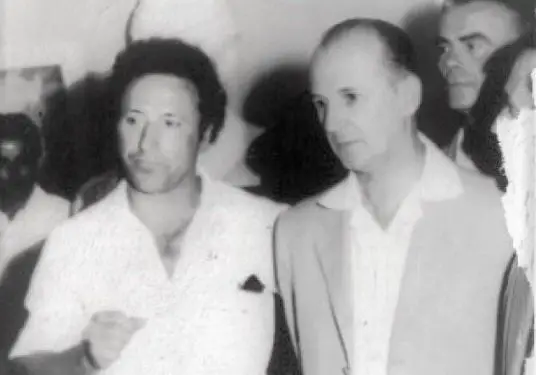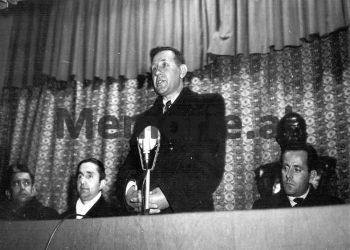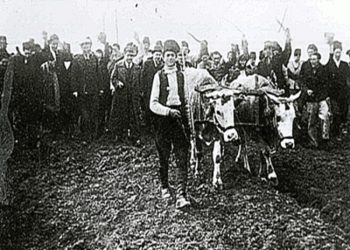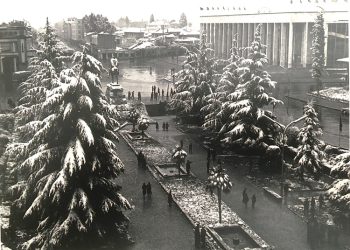By Bashkim Trenova
Part twenty-eight
Memorie.al publishes the memoirs of the well-known journalist, publicist, translator, researcher, writer, playwright and diplomat, Bashkim Trenova, who after graduating from the Faculty of History and Philology of the State University of Tirana, in 1966 was appointed a journalist at Radio- Tirana in its Foreign Directorate, where he worked until 1975, when he was appointed as a journalist and head of the foreign editorial office of the newspaper ‘Zeri i Popullit’, a body of the Central Committee of the ALP. In the years 1984-1990, he served as chairman of the Publishing Branch in the General Directorate of State Archives and after the first free elections in Albania, in March 1991, he was appointed to the newspaper ‘Rilindja Demokratike’, initially as deputy / editor-in-chief and then its editor-in-chief, until 1994, when he was appointed to the Ministry of Foreign Affairs with the position of Press Director and spokesperson of that ministry. In 1997, Trenova was appointed Ambassador of Albania to the Kingdom of Belgium and to the Grand Duchy of Luxembourg. Unknown memories of Mr. Trenova, starting from the war period, his childhood, college years, professional career as a journalist and researcher at Radio Tirana, the newspaper ‘People’s Voice’ and the Central State Archive, where he served until the fall of the communist regime of Enver Hoxha, a period of time when he in different circumstances met many of his colleagues, suckers of some of the ‘reactionary families’, etc., whom he described with a rare skill in a book of memoirs published in 2012, entitled ‘Enemies of the people’ and now brings them to the readers of Memorie.al
Continued from the previous issue
“Enemies of the people”
The sentence of Pipi Mitrojorgji, for the engagement of his son with the daughter of Feçor Shehu!
At the meeting of the organization of the “Voice of the People” Party, in fact, nothing was said that had a direct connection with the work or activity of Pipi Mitrojorgji. Pip’s fault was that his son was married to Nina, the daughter of Feçor Shehu, Minister of Internal Affairs. His crime was that he was not Max, the son, to decide not to love Feçor’s daughter. He was guilty because it was Pipi, his father. He, as well as his son, would be punished because the dictator himself had promoted Feçor Shehu to the delicate post of Minister of Interior, while they did not anticipate, did not predict that Feçori would be declared a traitor later by Enver Hoxha himself. In complete “ignorance” about the future, Maxi had fallen in love and married the daughter of Feçor Shehu, while Pipi had not even thought to allow the connection of young people, not to accept the marriage with Feçor!
As usual, before the party organization convened, Fatos Cekodhima, the organization’s secretary, called me to his office and, if I am not mistaken, Mehmet Elezin or Spiro Kufon, who at the time were members of the organization’s bureau. Conveyed the orientations received from the Central Committee, thus showing us how the Party organization should be oriented, why and how Pipi Mitrojorgji should be criticized, what should be the measure that would be taken against him. This was then called “democratic centralism”, so democracy was centralized, decisions were taken centrally by the top leadership of the Party, and the base had to implement them “democratically” after an enthusiastic, always approving discussion.
The meeting of the organization took place, as expected, without any surprises. Pipi was severely criticized, measures were proposed against him, as were the orientations. Pipi himself was out of reality. He tried to discuss with reason, to defend the marriage of his son with the daughter of Feçor Shehu, made in conditions when it could not even be thought, it would even be a crime to think, that he would one day be shot as an enemy and a traitor. Pipi tried to separate the fate of the young people from that of Feçor Shehu. He spoke of his son as a talented architect, if I am not mistaken, spoke of the contribution he could make to the place in his field, i.e. in that of construction. He spoke warmly of his son’s girlfriend.
Pipi was not a young, inexperienced communist. He had no way of not knowing that his words would not change anything in the course of his fate and that of his family. He, however, had to speak. Silence could be interpreted as stubbornness and non-reflection, as an attitude of disagreement with what the Party said and would decide. Seen from this point of view, his discussion, being completely futile, was probably the most useful one possible.
Pip was removed from Tirana. He was sent, along with his family, to Kruja. There he worked as editor-in-chief of the local newspaper “Kastrioti”, where Albert Shala had previously worked after leaving Radio Tirana after the IV Plenum of the Central Committee of the Party. The Central Committee “deviated” from the orientation it had given us as an organization, softened the decision. Pip, as in other cases with others, was thus shown how wide the Party was, that it looked far, that it was more compassionate than colleagues and friends, who had made a decision by which it could not to agree! After that, Pipi had to cheer loudly for the Party, which was enough only with his departure from “Zeri i Popullit” and Tirana and did not go further!
Pipi Mitrojorgji was a well-known figure in the field of culture, journalism and literary criticism. For many years he had been Deputy Minister of Culture, Director of the Press Directorate in the Central Committee and Secretary of the Party for Ideology in the district of Fier. I have known him as kind and fair to people. He, as I was told, gave all possible assistance to Paskal Milos, who was sent to Fier after leaving “Zeri i Popullit”. It is the same with the well-known writer Teodor Laço, with the talented director Pëllumb Kulla, condemned by the Party for their creativity outside its framework. Likewise, when Ismail Kadare was sent to a village in Fier “to know life”, he called the chairman of the cooperative to say: “The great writer Ismail Kadare will come to your cooperative. You will welcome him with the greatest respect … ”!
In one case, as I was told, he told a director, also convicted by the Party and forced to work as a worker, that: “it is an honor to work all my life as a worker.” He has thus repeated an empty Party slogan. If this were true, why did none of the main leaders of the Party, including the dictator himself, set an example with their children, why did they deprive themselves of this honor? Are we dealing with a duplicitous attitude of Pippi? Maybe yes, but it also shows that he, when he had the opportunity, extended his arm. This also shows that this extension arm certainly had its aims and was conditioned both by his own formation as an old communist militant, (that during the War, quite young, he was commissar and in charge of the Battalion youth), as well as by other factors, outside of it. This kind of duplication has made, perhaps, the thoughts, opinions about Pip to be different.
During the time I worked with Pipi Mitrojorgji, excluding the daily routine, I remember two events without any special significance, but quite significant. I had submitted to him an article on international issues, which I had written according to some opinions, which had been transmitted to us by the Central Committee of the Party. Sofokli Lazri, the dictator’s top foreign policy adviser, did not like the article. He returned the article, but without making any concrete remarks or suggestions. In these circumstances I, somewhat offended, told Pip that I have nothing to do with the article, for me it is realized, I have thrown in it what I could. Pipi, who had read the article and, knowing that the relationship between Sofos and me was not at all social, told me to send it down to the printing house for publication. Surely Sophocles would not be pleased with Pippi’s decision, and he knew it when he decided to publish the article.
With Pipi Mitrojorgji for comfort at the house of Sofokli Lazri!
After a few months Sofokli Lazri’s father or mother died, I do not remember well. In Albania, as a rule, friends, colleagues, friends and relatives, in such cases, go for a condolence visit to the home of the deceased. It did not seem to me to be part of either Sofokli Lazri’s friends and colleagues or relatives, so it had not even occurred to me to go and comfort him at home. Pipi, taking advantage of a moment when I was in his office, says to me with a laugh: “I do not know what you have to do with foreign relations that do not go well between you. “Do not leave the office, because soon we will go to Sofo together for comfort.” We went to Sofokli Lazri together, but this visit did not affect our relationship at all, as Pipi wanted very kindly.
I met Pipi Mitrojorgji for the last time after the overthrow of communism. We met by chance, near the newspaper “Zeri i Popullit”. Together, we generally had normal, correct, but never friendly relationships. At this meeting we hugged like old friends. I even had a kind of reservation, because I was reminded of the meeting of the Party organization and I did not remember how I had spoken, if I had aggravated it, according to the guidelines of the Central Committee, or I had “deviated” somewhat from them!
Pipi, like Hamdi Sollaku, like many veteran communists, found it difficult to adapt to the changes that took place in Albania after the fall of the dictatorship. This is not that he stood in the position of a fanatical communist. Pipi loved democracy; he had expected it, as he says it seems to me in one of his poems, but not as it came. “Democracy is angry,” Pipi said in an interview. He did not want her that way. He had reservations and this led to aggression in the right-wing press, even with jargon, which does not do honor to their authors.
In the years of democracy Pipi published a volume of poetry entitled “Heartbreak”. This was also his message before he left us: Many conflict situations, anger, insults, half a century of dictatorship, we are crushed and exhausted, let us give and receive “cordiality”! It is this message of a humanist revolutionary, who loved communism to the end, but a communism with a human face. Was this possible? For an idealist even the impossible is possible.
After the arrest of Feçor Shehu, his wife Majnuri and her two daughters were interned. One of them was the wife of Pippi’s son, who as far as I know, was forced to divorce. The major was the sister of my old friend, Agron Çobani. That was enough for him and his whole family to be put under the tragic blows of the dictatorship.
With Agron Çobani and Albert Shala one night in the isolation room!
Agron and I were known as students. He continued his studies for Language-Literature while I for History-Geography. In the Faculty I remember Agron as a happy boy, satisfied with him and with life, with a noisy humor, always pleasant. I got to know him somewhat better in the summer of 1964 when we went to Korça to do military training. I remember spending a night together in solitary confinement or in prison, as the soldiers called it. In fact with us were also Albert Shala and another, who now I do not remember. The cause of our “imprisonment” was quite banal. We, one Sunday, had crossed the wall of the military ward and had gone out into the city without permission. There, unfortunately for us, at one point we suddenly happened to be in front of the choir commander. He ordered our passage to the isolation room. Previously we had our shoelaces and trouser belt removed. We later learned that this served as a precautionary measure, so that convicted soldiers could not hang themselves.
Of course we did not even think of hanging ourselves because we had violated military discipline by going out into the city without permission or because we were going to spend a night in solitary confinement. For us, this preventive measure became a refrain of jokes, stories, conjectures and “intriguing” rumors, which helped us to pass that evening without feeling it. Agron was their champion. He did not stop talking in vain and in vain and we did not stop laughing in vain and in vain. We all did not stop singing in the dark in vain a partisan song, or a military march. Maybe we thought of ourselves as “heroes”. On the other side of the wall we heard the guard officer shouting the command: “Student friends, the song is forbidden!” We started laughing again because it seemed absurd to stop the song or to imprison the song with us!
I got to know Agron better on Radio Tirana. He and I were in different directorates, but we did the collective and youth meetings together. We both started working in this institution as ordinary journalists. Agron started with the news and chronicle to move on to telereporting, documentaries and radio dramas. He delivered all genres of radio and television journalism. With his tape recorder “UHER” in his arms, always tireless, he trampled Albania for years from South to North, collected pieces of life in villages and mountains, plants and hydropower plants, in the circles of artists and writers, academics and scientists. With a lot of work and merit, he climbed the professional career ladder, becoming the Head of the Sector, director of Television and finally the General Director of the Albanian Radio Television.
How they retouched the portrait of Agron Çobani from the photo with Enver Hoxha!
Recalling Agron’s work on Radio Tirana, I cannot help but think of a photograph he captured with the dictator during a visit to the mountains of northern Albania. In this photo, Enver Hoxha is sitting “knee to knee with the people”. He is fixed sitting cross-legged talking to some highlanders and behind him is Agron Çobani indifferent, without pretending to be enthusiastic or happy, recording the conversation. This photograph was enlarged, exhibited in the country’s museums and served for years as a propaganda tool to show how close to the people’s troubles the dictator was how simple and magnificent he was! Agron did not have the “luck” to be permanently obsessed with the dictator. The photo, after a few years, was retouched, eliminating Agron Çobani. After the arrest of Feçor Shehu, Agron, being his brother-in-law, was no longer desirable to the regime. He had to be retouched, disguised, isolated, forgotten not for his own fault, nor for any mistake made in the work, much less as a dissident or opponent of the regime.
Xhelil Gjoni and Sofo Lazri communicated to Agron to leave RTSH!
On the same day that Feçor Shehu was arrested, Agroni was summoned to a meeting by the Secretary of the Tirana Party Committee, Xhelil Gjoni. In his book “Ju flet Tirana”, he presents the casual conversation with Xhelil Gjoni like this: “- Feçor Shehu was arrested ‘, he told me bluntly.”You,” he continued, “trust the Party and take a correct stance. The Party will look at things calmly and correctly.”
“Definitely,” I seem to have said at that moment. – But why was he arrested?!
-As a dangerous and sworn enemy of the Party and the people. You are doing well not to ask too many questions”!
Of course Agron should not have asked not much, but not even a single question. During the dictatorship, the Party asked questions. They were addressed to her supposed enemies, who thus had to open their hearts and show how treacherous they were and what plots they had hatched to overthrow the dictator! Agron and anyone else in his country, if they dared to ask a question, could be asked, “Why do you ask?” or worse, “What do you hide in your head?”
After Xhelil Gjoni, Agron was summoned to the Central Committee of the Party by Sofokli Lazri. He simply informed him that he would no longer be the director of the Albanian Television that the Party had intended to hire him as a screenwriter at the Kinostudio “Shqipëria e Re”. Sophocles, saying: “I believe you agree you understand yourself”, left no room for any questions, just like Xhelili.
Agroni started working at the Kinostudio “Shqipëria e Re”. She knew many of her employees there, but no one dared approach her. He was isolated in his office accompanied by the anxiety of the unknown. He knew that Kinostudio was not his last station towards hell, he knew his stairs well, he had memorized them like all of us, studying the “History of the Albanian Labor Party”. Agron was not sure only if hell would be the prison, or before him it would penetrate somewhere in some deep mountainous area where the sun neither rises nor sets. “At that time, without leaving Tirana yet”, says Agron Çobani, “when I heard about the arrest of one or the other, I thought of myself…! “I have spent many terrible days and nights under the pressure of possible arrest.”
Agron Çobani also left Kinostudio, sending him to Martanesh!
In fact, Agron was quickly removed from Kinostudio as well. He was sent to the mountainous area of Martanesh, in Krasta, a mining town located in a narrow valley between the mountains. There he started working as a teacher of ‘Albanian Language or Literature’ and at the same time of ‘Russian Language’, although he knew almost no words from this language! Here, and then in Fushë Krujë and Nikël, he spent his decade of great loneliness, away from his mother, a little older, Ibos, who I remember for her generous heart, her shy laughter as a child, as well as for the wonderful pies he made. He would not be near her in the most difficult days, as well as his children and his wife, Luli, who was left with the task of caring for them alone, with hardship and sacrifice, sometimes with work and sometimes without work.
In addition to his sister, Majnures, Agron also had three brothers; Melsin, Astrit and Hasan. No one was spared from the dictatorship. Their lives and those of their families were ruined, ruined even though no one owed any debt to the Party, the dictator, the government. They were all honest people, who loved the Party. Throughout their lives, they had worked tirelessly, without hurting anyone. All three were honored and respected people.
The tragic fate of the three brothers of Agron Çobani!
Melsi was the youngest among them. I knew him as an open guy, with an athletic body, always smiling. He was a talented footballer and when he was young he played with the stars of Albanian football. Melsi was also removed from Tirana and sent to the remote areas of Northern Albania. Only after almost a decade, he was allowed to return to Tirana, in its mountains, to Gurrëz, so again not in the city, not near his family. The dictatorship even though it was in its last breaths, always continued to hit its victims, not allowing them to live the years they had left of their devastated lives. In Gurrëz, Melsi’s health suffered its first major blow. He spent a week in a coma. Doctors said it was all as a result of the stress he had gone through in life. The same second blow would be fatal to him and his entire family. Melsi would no longer stand up. He also took with him the dream of his youth, to become a football star. We would not see him again. He did not ask for much in life, but even the little he asked for was killed by the masters of death for no reason, for no reason.
Agron’s other brother, Astrit, was an officer, a tanker. In 1982, he was also removed from Tirana and sent to Laç. His family was evicted from the apartment where he lived in the capital and left on the main street. Astrit would return to Tirana in 1990, after retiring. Agron shows that in recent years he did not speak, almost did not react, and often cried. He did not want to be separated from life without providing a shelter for his family. It was not said. She took refuge in a studio, but she too was demolished. The land where the studio was built needed a Socialist MP to erect a palace. Thus, Astrit found refuge only in his last dwelling. Death proved more generous than life with him.
Even more tragic is the fate of Hasan, Agron’s older brother. He lived in Lushnja, was a simple administrative employee. He could not cope with the situation and ended his life by “choosing” an end to horror instead of endless horror.
In 1991, after the fall of the dictator’s statue in Tirana, Agron returned to the Albanian Radio and Television. In December of this year, he was appointed General Director of the Albanian Radio and Television. “Ten years of toil, contempt, fatigue, hardship, from economic to spiritual, had weakened me. I could not, I did not want to deal with anything “, writes Agroni in his book” Tirana speaks to you “. In this situation, however, he gave the Albanian Television a new physiognomy, allowed an objective reflection of the new Albanian realities, thus giving his help in the victory of democracy in Albania.
In 2006, Agron was retired. The ruling Democrats had previously asked him to make “reforms” to the Albanian Radio-Television. In fact, these “reforms” had nothing to do with the structure of the programs or their content, but simply with the removal from this institution of a mass of employees, who were not shown “with us”, that is, in one way or another. Another had been reluctant or refused to support democratic forces. Agron refused to make this “reform”, to take to the streets and leave his colleagues without any means of livelihood, just because they had their own political preferences or beliefs. He paid dearly for the “class war” in the dictatorship. Among other things, he felt the consequences by going to the operating rooms several times, where, as he says, his body turned into a “sewn mattress”! Recent surgeries were those of the heart and pancreas. Agron could not and did not accept a “new class war” even though this was required in the name of democracy! /Memorie.al
The next issue follows




